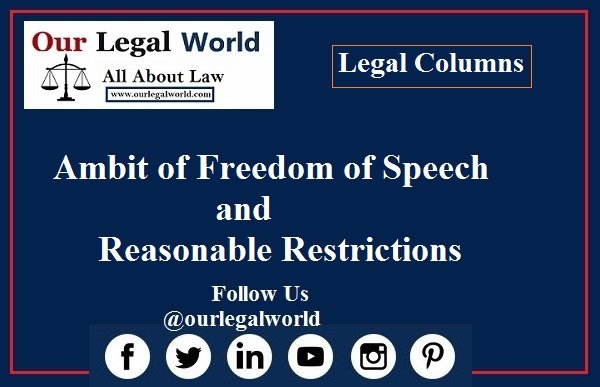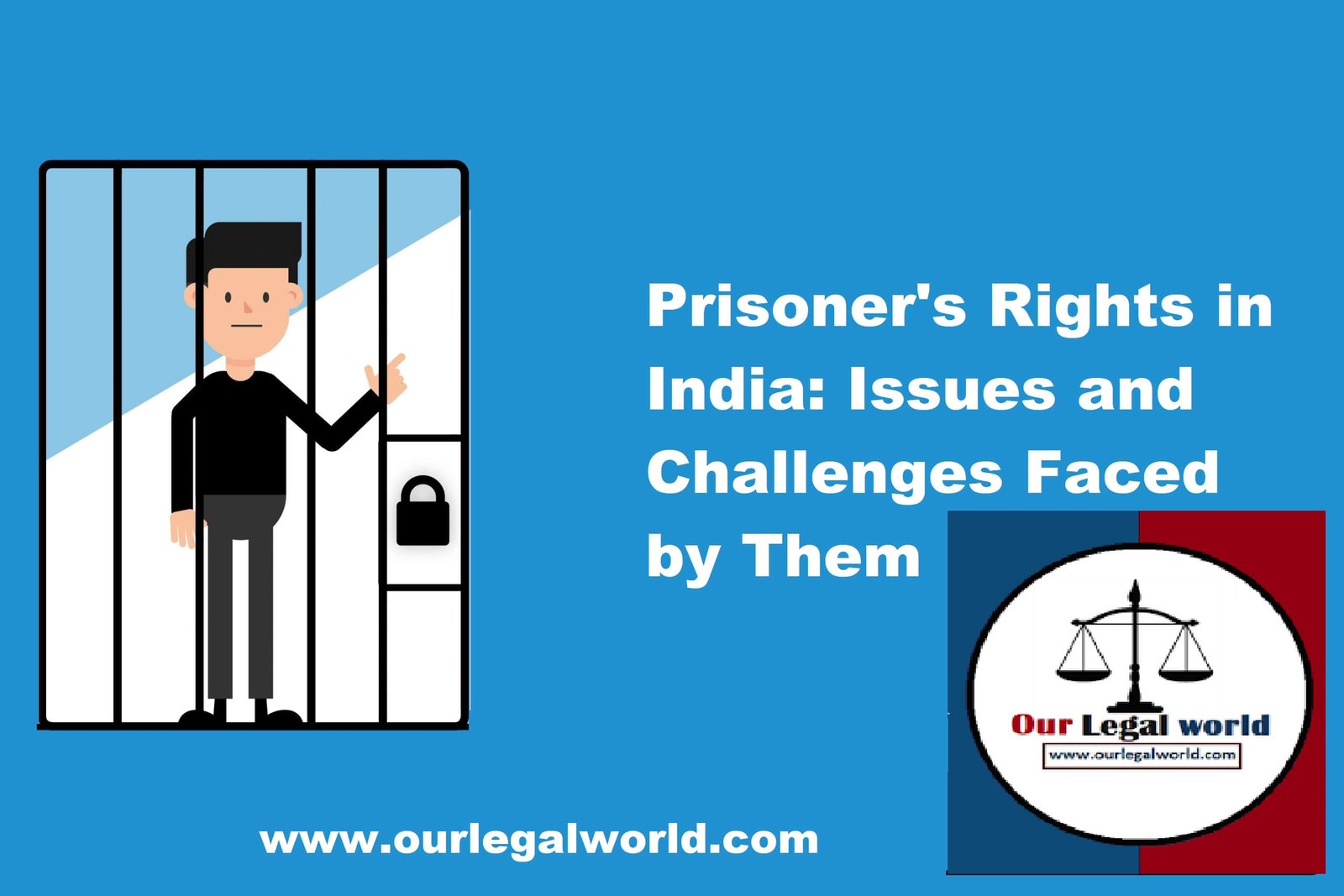Ambit of Freedom of Speech and Reasonable Restrictions: Our Legal World
Introduction
Every human being is born with some inherent natural rights i.e. personal liberty, freedom, equality etc. Freedom of speech and expression is one of the natural rights of human beings. It is an obligation of every government of the world to provide its citizen with the right of free speech so that their ideas, and analysis can be used as a tool to understand the needs of the country. If in any country, citizens are not provided with a right to free speech and expression, how the government of that particular country will understand the sentiments of the countrymen? Right to Voice or freedom of speech and expression has been a very important segment in all democratic countries. India being the largest democratic nation, has guaranteed the right to speech and expression to all its citizens without any discrimination. India has also signed international conventions to ensure the freedom of speech and expression to its citizen. There are some international declarations i.e. Universal Declaration of Human Rights and the International Convent on Civil and Political Rights which expressly provide for a mandate of freedom of expression of ideas, opinion and speech without any hindrance and without any discrimination.
History and Evolution
The history of freedom of speech and expression can be traced long back. It was an important democratic principle of the Ancient Greeks. They used the term “parrhesia” to imply “free speech”. At the end of the fifth century, this concept of free speech and expression, without any hindrance and unreasonable restrictions, became very prominent in Greek literature. In our Constitution, the provisions which deal with the right to speech are enshrined in Article 19. The concept of free speech has been borrowed from the American jurisprudence. In the United States, the very first constitutional amendment was made in order to provide the guaranteed right to free speech and expression of ideas and opinions, under the Bill of Rights.
During colonial rule in India, the English tried their level best to curb the voice of Indians. Whenever the English felt that Indians are spreading hatred against them, they behind the veil of statute or law, tried to curb the voice of the people. Many Acts were passed by the British to restrict people in raising their voices against their mala fides. Insertion of Section 124A in Indian Penal Code, 1860, which provides for the offence of sedition, Vernacular Press Act, 1878 which restricted the freedom of the press to publish anything which was not in favour of British Government, The Newspapers (Incitement of Offences) Act, 1908, and The Indian Press Act, 1910 (repealed in 1921) are some laws of British government to suppress the voices and opinion that went against them. The founding fathers of our Constitution were well aware of these instances where people were forced to suppress their voices. Therefore, they decided to provide all the citizens with the right to express themselves, to raise their voices, to speak about their views and opinions. At the very outset, they provided the right to freedom of speech and expression to all citizens under Article 19(1) which forms a very vital part of our fundamental rights enshrined in our Constitution. Notably, they knew very well about the importance of this right. Constitutional Fathers did not make this right an absolute one. Some reasonable restrictions can be put on this right. They realised that liberty has to be limited so that it can be effectively exercised.
Right to Speech
Freedom of speech is the right to say whatever you like whenever you like, right? Wrong. According to Amnesty International, “Freedom of speech is the right to seek, receive and impart information and ideas of all kinds, by any means” these expressions may include deep offensive expressions as well but that can be legitimately restricted.
Therefore, Indian Constitution provides to all citizens of the country the right to freedom of speech and expression. Freedom of speech denotes right to free speech given to an individual to express his thoughts, ideas, opinion and whatever he feels like expressing, without any hindrance and without any fear of being punished by the State provided that this right shall be in compliance of some reasonable restrictions. Article 19(1) guarantees to the citizens of India the following six rights:
a) Freedom of speech and Expression;
b) Freedom of Assembly;
c) Freedom of form Associations;
d) Freedom of Movement;
e) Freedom to reside and to settle;
g) Freedom of profession, occupation, trade or business,
but these rights are not absolute and are subject to restrictions mentioned in Article 19(2). This right can be controlled and limited by the State in view of security of State, friendly relations with foreign States[1], public order[2], decency or morality, contempt of court, defamation[3] or incitement of offence[4], sovereignty and integrity of India[5] etc. Though Sedition is not included under Article 19(2) but in the case of Kedar Nath v. State of Bihar[6], it was observed that sedition defined under Section 124A of Indian Penal Code, 1870 is a limitation on Article 19(1) read with Article 19(2). Thus, it not violative of the fundamental rights.
Freedom of expression, basically serves following four purpose:
i) Helps an individual to attain self-fulfilment,
ii) Assists the discovery of truth,
iii) Strengthen the capacity of an individual in decision-making,
iv) Provides a mechanism by which it would be possible to establish a reasonable balance between the stability and social change.
This right of freedom of speech and expression is not exhaustive and exclusive but it is an inclusive right and open to the interpretation of the Judiciary to include more practices which may come under the ambit of this right. For example, right to speech also includes right to silence[7], right to get information[8], right to reply[9], right to furling the National Flag[10], Freedom of speech and expression includes right to express oneself, right to express one’s thoughts, ideas, opinion by way of not only speech but also by publishing them in press or books, by way of picturization, electronic media or any other way in which one likes to.
Freedom of Speech and sedition laws
The sedition law was introduced by the British government to curb the voice of Indian revolutionaries. Initially, it was not introduced in the draft of IPC, 1860 but when it was seen by the Englishmen that Indian are increasingly criticising and raising their voice, it was added in IPC, 1870 under Section 124A which reads as:
Whoever, by words, either spoken or written, or by signs, or by visible representation, or otherwise, brings or attempts to bring into hatred or contempt, or excites or attempts to excite disaffection towards the Government established by law in India, shall be punished withimprisonment for life, to which fine may be added, or with imprisonment which may extend to three years, to which fine may be added, or with fine.
Explanation 1- The expression “disaffection” includes disloyalty and all feelings of enmity.
Explanation 2- Comments expressing disapprobation of the measures of the Government with a view to obtain their alteration by lawful means, without exciting or attempting to excite hatred, contempt or disaffection, do not constitute an offence under this section.
Explanation 3- Comments expressing disapprobation of the administrative or other action of the Government without exciting or attempting to excite hatred, contempt or disaffection, do not constitute an offence under this section.
Therefore, any attempt to bring hatred or to excite violence towards the government shall amount to the offence of sedition. During pre-independence time, in 1891, Jogender Chandra Bose was the first amongst the people who were tried under charges of sedition for ‘exciting disaffection’ towards government’s policy. He was the editor of a newspaper, named “Bangobasi”. In an article, he criticized the Act of Age of Consent Bill, which in his view was posing a threat to religious sentiments of the countrymen.
Another instance of framing charges of sedition on criticizing the government policy was of Bal Gangadhar Tilak, in 1897 which changed the effect of sedition law. When he was charged with sedition, it was argued against him that the speeches he made on the killing of Afzal Khan by Shivaji, had prompted the murder of two British officers. Here the bench equated the term “disaffection” with “disloyalty” to the policies and affairs of the colonial government. He was charged with sedition twice. The second time was for the publishing of a critical article of government affairs in ‘Keshari’.
In 1922, MK Gandhi was also charged with sedition. He wrote a critical article in ‘Young India’ magazine in which he denounced the sedition laws. In regards to sedition, he opined that “Section 124A under which I am happily charged, is perhaps the prince among the political sections of the IPC designed to suppress the liberty of the citizen.” Whatever Indian leaders were trying to publish according to their views, they were restricted in many ways. They were ignited the Indian minds against the British policies but English tried their level best to curb every voice raised against them. They were tried under criminal law.
Therefore, in pre-independence India, it was clearly visible that there was no freedom of expression. Insertion of this concept of sedition in IPC was arbitrary and unreasonable. The State was not based on Democratic ideals and principles at that time. So, criticizing the government policies was understood as a means to invoke hatred or violence in the country. But post-independence, the right to speech and expression was made liberal and inclusive. The sedition law has been deleted from the Constitution but continues to be a part of IPC. The interpretation about balancing the Freedom of speech & expression and sedition was provided in case of Kedar Nath v. State of Bihar[11]. In this case, the Supreme Court of India, for the first time decided the scope of Section 124A of IPC read with Article 19(1) & Article 19(2) of Constitution. It followed the assertion of Federal court which states that “public disorder or the reasonable anticipation or likelihood of public disorder is the gist of the offence”. The Apex Court upheld the constitutionality of sedition and observed that:
“It has been contended that a person who makes a very strong speech or uses very vigorous words in a writing directed to a very strong criticism of measures of Government or acts of public officials, might also come within the ambit of the penal section. But, in our opinion, such words written or spoken would be outside the scope of the section.”
In the abovesaid case, the accused, Kedar Nath had made certain critical speeches against a political party and Criminal Investigation Department. He had alleged that the political party was a corrupt party and was indulge in black-marketing. He had also talked about a revolution that would overthrow these party-goondas, capitalists from the country. The court reasoned that sedition penalises the words which have a tendency to incite violence and reveal an intent to disturb the law and order. Kedar Nath, the accused was convicted in this case for charges of sedition. This case limited the scope of sedition law but still people are being charged with sedition for mere criticism of government in public arena, mere expressions of detest and abhorrence for State policies.
Also Read: Common Cause vs. Union of India [Passive Euthanasia]: Case Analysis
Here the most important underlining thing is that if criticising a political party would lead to charge of sedition, where does the democratic ideal lie. In any democratic country, criticism and expression of one’s view regarding the ruling government is considered as a basic pillar of liberal democracy. Without criticism, the ruling government may behave like an autocrat.
Sedition was an arbitrary step of colonial government and today, it is a restraint to the democratic ideal and principle. It tries to restrict the rights given by Constitution. For any vibrant democratic country, a constructive and critical public debate or discussion is necessary for its smooth working. It has always been a tool to harass the citizen on criticising any policy and state affair.
In 2010, Arundhati Roy, an Indian author, was also charged with sedition when she made a certain speech about Kashmir or Maoists. She has certain opinions which she expressed and also, that opinions didn’t incite any violence. In 2012, an Indian Cartoonist Aseem Trivedi, who made a cartoon over corruption, was also brought under charges of sedition. There is a long list of the person who has been brought under the charges of sedition in recent time. Since 2014, the National Crime Records Bureau has started to maintain a separate record for sedition cases. For the year of 2019, it claims that there is 30 % increase in sedition cases. It must be noted that Britain, who introduced it in India, has also abolished its sedition law to give a healthy effect to the right to freedom and expression and to give due effect to the international conventions which it signed. Thus, there is a need to repeal the sedition law in our country because, in spite of having a constitutional guarantee to freedom of speech and expression, citizens are not in a position to completely express themselves in the way the citizens of a democratic country should. For the time being, this law is being used as a tool to suppress the liberty and freedom of citizens.
The freedom of speech and expression was given by the Constitutional Fathers to allow and make citizens capable of criticising the ruling government and express themselves in the best possible manner. They can exercise this right with some basic and reasonable restrictions mentioned under Article 19(2) of the Constitution. Freedom of speech and expression must be distinguished from sedition. Though limitations are necessary if those limitations fade the very purpose of this right, the democratic principles will start losing its true essence.
Also Read: Ubi Jus Ibi Remedium- LEGAL MAXIM with explanation
Written by
Preeti Sharma (2nd Year LL.B, Campus law centre) and Jyoti Sharma (2nd Year, LL.B UILS, Panjab University,Chandigarh)
[1] Added by Constitution (First Amendment) Act, 1951
[2] Ibid
[3] Defined in Section 499 of IPC, 1870
[4] Added to Art 19(2) by Constitution (First Amendment) Act, 1951
[5] Added to Art. 19(2) by Constitution (Sixteenth Amendment) Act, 1963
[6] AIR 1962 SC 955.
[7] National Anthem Case, (1986) 3 SCC 615
[8] Secretary, Ministry of I & B v. Cricket Association, Bengal, AIR 1995 SC 1236
[9] LIC v. Manubhai D. Shah, (1992) 3 SCC 637
[10] Union of India v. Naveen Jindal, (2004) 2 SCC 410
[11] AIR 1962 SC 955








![Tax Law Internship at Legum Attorney [Chamber of Ashish Panday], Delhi : Apply by 15th May 2025](https://www.ourlegalworld.com/wp-content/uploads/2025/05/IMG_0113-min.png)

